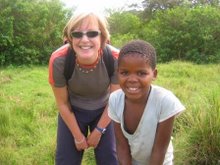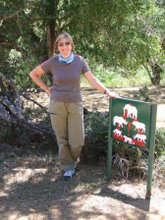Rachel Grant has told me all about Lamu, so we head off at dawn to the bus with high hopes. These are dashed somewhat when it becomes apparent that the big, new, yellow bus is not for us and we are loaded onto a sad old wreck with more welding repairs than I care to think about. Still, we have good seats for a change, and it's a comfy enough journey considering the state of the roads and the age of the bus. En route we pick up a couple of soldiers, who climb on board clutching their rifles and, after hopefully eyeing our seats, sit right beside our backpacks. Armed guards, that should keep 'em safe!


Your average Kenyan long distance bus. Cheap and cheerful hardly begins to describe them.
It takes just over six hours to get to Mokowe, from where we pile onto an old dhow, upgraded with a diesel engine, for the quite pleasant trip round to Lamu. We're then set upon by a group of very persuasive young men for the final boat leg to Shela beach. We have a guest house in mind, but agree to view their 'house'. After some serious haggling we rent for the next six nights the top floor of the house - bedroom, bathroom, living spaces, kitchen, rooftop terrace, and a houseboy called Albert, for 1200Ksh/night.
The shady verandah of Lamu´s British house.
Albert is despatched to stock the fridge with beer and wine and we go out for a well-earned meal and a walk along the beach. Every second person we meet seems to be a dhow captain, and they all offer fishing trips, trips to nearby islands and ruins, with bbq lunches, etc. The evenings seem quite quiet, lunch is the social meal of the day and the hours from 4-6 are when the cafes are full of men drinking chai and talking over the day.We while away the evening on the terrace, looking at the stars, listening to the donkeys and the sounds of our neighbourhood, and even a little mosque chanting for atmosphere. Our local mosque has dispensed with a loudspeaker and relies instead solely on the human voice to call the village faithful to prayer. This could be another one for the suggestion box.
In the light of day the view from our terrace reveals many other similar arrangements - the roofs are divided into thatched-roofed areas for sitting, open areas for laundry and a few pot plants, leaving space for the all-important satellite dish. The papers are all a day late, but does it really matter when you can get news as it happens on Aljazeera - which astonishingly is currently advertising the show Made in Taiwan: Nathan and Oscar’s Excellent Adventure. Must be the TV3 connection I guess. Almost as odd as hearing "How Bizarre" by OMC on the radio at the dentist in Nairobi the other day.
Our first full day on Lamu starts slowly, and this proves to be the general pattern of things as we slip easily into the groove of life here. There are lots of little shops round about us, stocking fantastic fresh tropical fruits - so we start our days with pawpaw, mango and passionfruit salads, and I even made pancakes one morning. The beach is a few minutes walk away, but the weather's a bit squiffy, sometimes drizzly, and often windy, so we only end up swimming a few times. There are donkeys all over Shela; used as transport on the largely vehicle-free island and to carry loads from fruit and vegetables, to the coral bricks used in building, to a goat which I saw squished into a woven basket slung over a donkey's back. They seem to wander around all over the place, and at the moment have young ones, which are very cute. It rained hard one night, but what woke us was the bellowing of the donkeys. We also notice many more women wearing full face veils here, more even than in Mombasa. Look on the map, we're not so far from Somalia and you can see it in the people.


Donkey´s rule on Lamu. They seem useful, content and well looked after - but still some enthusiastic (and possibly misguided) Englishwoman has set up a donkey sanctuary here for them. We saw a only a couple of animals in her grassy enclosure.
Lamu town is a forty minute walk away, and it's nice to stroll down there poke around the back streets, buy a paper and a decent coffee, have a bite to eat and a drink, and catch up with the locals (all very friendly) and fellow travellers. Sarah and Pat from Ireland have joined us in our house in Shela, renting the other bedroom on our floor, and they introduce us to Maaike and Maaike, two Dutch midwives who have been doing an internship in Eldoret. One night we all agree to eat with Ali Hippy, a bit of a local identity, who invites us to his house and cooks up a storm. It's a pleasant if slightly surreal evening, as we are collected from a local bar, and walked up, down and around to his house, where we are sat down on the floor, the gloom lifted slightly by the light of a couple of hurricane lamps. The food is pretty good, if served at a bit of a fast clip, but then there's the entertainment. Ali plays keyboards and treats us to his "golden voice", and various relatives and friends join in. A couple of the children don't seem quite right, and the local village albino is also in attendance, but the music is nice and we all enjoy ourselves. At nine promptly we are sent back through the maze, put on a boat, and returned to Shela, a thousand shillings poorer!
One of the few local sights is a set of 16th century Swahili ruins on a neighbouring island. We're sold a trip there, including lunch, on a dhow. Max is fascinated by these single masted, classic sail boats, with their simple mechanisms of wooden beams, ropes and one large cloth sail, usually well patched. The other tourists on the dhow have been collected from Lamu jetty, but because of the wind they can't get the boat near Shela's, so Max and I are ceremoniously carried on board. The boat boys are definitely earning their money today. Because we need to go up a tidal channel some poling is involved but on our way back, when the wind is up, the boys on the boat really have to work hard to control and steer the dhow bakc to our beach. They are reassuringly competent though, even though the trip back is a tad scary. We don't end up seeing the ruins, opting instead to check out the surf at the beach on Manda Island - a nice change after the pond we have got used to at Shela.
A few more fruit salads and a few more dinners, and it's all over for us - time to stop being beach bums and to click back into traveller mode. We have decided to retrace our steps by road - firstly back to Mombasa (yep, another six hours on the bus), and then to Nairobi on Sunday. We haven't seen this bit yet as most of it was at night on the train on the way up. Max has a final (hopefully anyway) dental appointment with Mary on Monday morning,
Lamu town is a forty minute walk away, and it's nice to stroll down there poke around the back streets, buy a paper and a decent coffee, have a bite to eat and a drink, and catch up with the locals (all very friendly) and fellow travellers. Sarah and Pat from Ireland have joined us in our house in Shela, renting the other bedroom on our floor, and they introduce us to Maaike and Maaike, two Dutch midwives who have been doing an internship in Eldoret. One night we all agree to eat with Ali Hippy, a bit of a local identity, who invites us to his house and cooks up a storm. It's a pleasant if slightly surreal evening, as we are collected from a local bar, and walked up, down and around to his house, where we are sat down on the floor, the gloom lifted slightly by the light of a couple of hurricane lamps. The food is pretty good, if served at a bit of a fast clip, but then there's the entertainment. Ali plays keyboards and treats us to his "golden voice", and various relatives and friends join in. A couple of the children don't seem quite right, and the local village albino is also in attendance, but the music is nice and we all enjoy ourselves. At nine promptly we are sent back through the maze, put on a boat, and returned to Shela, a thousand shillings poorer!
One of the few local sights is a set of 16th century Swahili ruins on a neighbouring island. We're sold a trip there, including lunch, on a dhow. Max is fascinated by these single masted, classic sail boats, with their simple mechanisms of wooden beams, ropes and one large cloth sail, usually well patched. The other tourists on the dhow have been collected from Lamu jetty, but because of the wind they can't get the boat near Shela's, so Max and I are ceremoniously carried on board. The boat boys are definitely earning their money today. Because we need to go up a tidal channel some poling is involved but on our way back, when the wind is up, the boys on the boat really have to work hard to control and steer the dhow bakc to our beach. They are reassuringly competent though, even though the trip back is a tad scary. We don't end up seeing the ruins, opting instead to check out the surf at the beach on Manda Island - a nice change after the pond we have got used to at Shela.
A few more fruit salads and a few more dinners, and it's all over for us - time to stop being beach bums and to click back into traveller mode. We have decided to retrace our steps by road - firstly back to Mombasa (yep, another six hours on the bus), and then to Nairobi on Sunday. We haven't seen this bit yet as most of it was at night on the train on the way up. Max has a final (hopefully anyway) dental appointment with Mary on Monday morning,





No comments:
Post a Comment